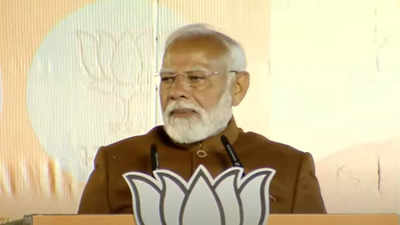NEW DELHI: PM Modi Tuesday aggressively defended the amendments to the Waqf Act, asserting these were necessary to neutralise the changes made by the Congress-led UPA as part of “politics of appeasement“, which primarily served the interests of fundamentalists and land grabbers, and had also led to India’s Partition.
“The 2013 changes placed the interests of… land mafia above the Constitution and effectively shut out avenues for justice for their victims,” the PM said as he referred to the appropriation of plots belonging to govt, churches, temples, gurdwaras and farmers by declaring them waqf property. The new law, which came into force on Tuesday, aims at rectifying these issues, he said.

The PM made these remarks at the “Rising Bharat Summit” organised by News-18 Group.
Pasmanda Muslims, everyone else will benefit from Waqf Act: Modi
The PM’s comments came on a day govt filed a caveat in the challenges filed by Islamic clerics and others, and a day after SC announced it would soon set a date for hearings.
Commending Parliament for passing the legislation to protect common Muslims, Modi said, “At the core of the controversy surrounding the Waqf Act is the politics of appeasement; its seeds were sown before independence. Other political parties empowered radical elements through waqf protests and also encouraged land mafias. Pasmanda Muslims and everyone else will benefit from this law.”
“Many colonies gained independence but did anyone have to pay the price of dismemberment for freedom?” he asked. The PM said, “Very few countries got their independence through partition. But it happened to India because politics was kept above national interest.”
In a reference to the widespread allegation about the misuse of the waqf law, especially because of the provision in the 2013 law that the designation of a property as waqf asset could not be challenged in a civil court, the PM said, “The law was meant to be an instrument of justice but it became a source of fear instead and gave rise to a false sense that it was above the Constitution.”
Asserting the amended Act is “in the interest of society and the Muslim community”, he highlighted the democratic process behind the legislation, noting that Parliament passed it after a debate lasting over 16 hours – the second-longest debate in its history.
In additional, he said, “Over 1 crore people shared their views with the joint parliamentary committee (on the waqf bill)”, which had sought public opinions online. “Democracy is no longer contained within the four walls of Parliament; it is strengthened with the participation of the people.”
Modi said politics of appeasement was at the root of the debate over the issue of waqf and it brought Congress to power and some Muslim fundamentalists became rich. “But, the moot question is what benefits did the ordinary Muslims get? What did the poor Pasmanda Muslims get? They were only subjected to neglect. They did not get education, they faced unemployment and Muslim women faced injustice like Shah Bano, where their constitutional rights were sacrificed at the altar of fundamentalism,” Modi said.
The PM said a similar attitude led to the country’s Partition in 1947, when Congress leaders did not wipe out the idea of a separate nation that was nursed by “some fundamentalists” and not ordinary Muslims, and Congress succumbed to their pressure for “lust of power”.


